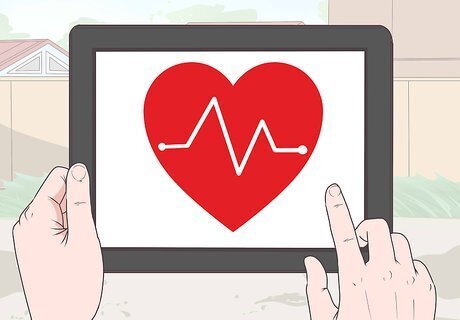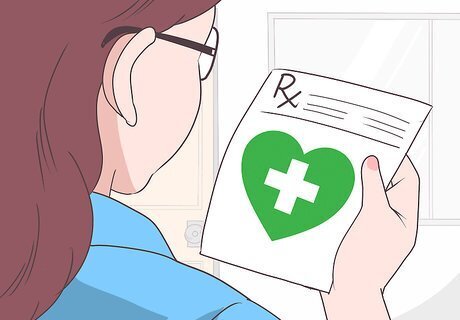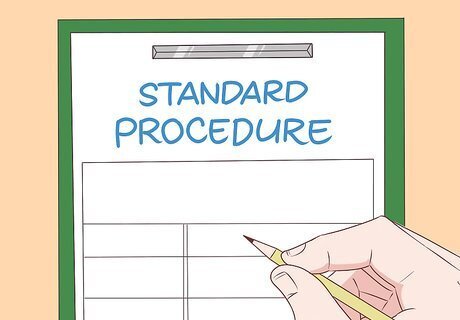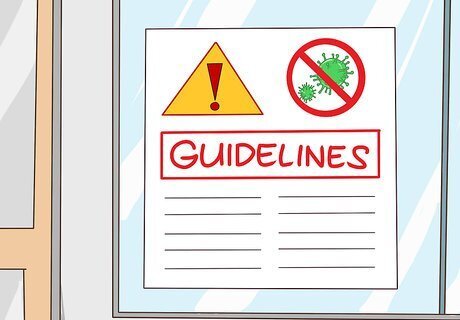
views
X
Trustworthy Source
American Psychological Association
Leading scientific and professional organization of licensed psychologists
Go to source
The good news is that there are steps that both patients and healthcare professionals can take to avoid these errors. If you’re a patient, you can protect yourself by speaking up about your concerns and giving your care team detailed information about your health. As a medical professional, you can prevent errors and give your patients the best possible care by communicating with your teammates and double checking before performing any medical procedure.
Preventing Medical Errors as a Patient

Let your care team know if you have any questions or concerns. If you are ever concerned about your treatment or unsure of why your doctor wants to follow a particular treatment plan, don’t hesitate to speak up. Explain your concerns and ask any questions you may have. For example, you might say, “I’m worried about the risks of having surgery for my condition. Are there any alternative treatments?” It’s also important to speak up if you suspect a member of your care team might have made a mistake. For example, “Another nurse just gave me a shot of that medication 15 minutes ago. Are you sure I need another dose now?”

Educate yourself about any health conditions you have. If you’ve been diagnosed with a medical condition, it’s important to learn about your condition and the possible treatment options. That way, you can be an informed advocate for yourself while you are receiving care. Ask your doctors, nurses, and other members of your healthcare team any questions you have, and look for more information from other reliable sources.Tip: The Effective Healthcare Program website, operated by the Agency for Healthcare Research and Quality, is a great source of information about current treatment options for a variety of health conditions. You can view their health topics database here: https://effectivehealthcare.ahrq.gov/health-topics. Use caution when researching your condition online. Try to stick to medically sound sources, such as articles from medical journals, hospital websites, and government healthcare organizations (like the Centers for Disease Control in the U.S. or the National Health Service in the U.K.).

Have a family member or friend accompany you to appointments. Having a second person present to take notes, ask questions, and bring up concerns you may not have thought of can be very helpful. If possible, ask a friend or loved one to go with you to important appointments so they can act as your advocate. In some situations, you may need someone else to make important care decisions for you (e.g., if you are undergoing a risky surgery and can’t consciously consent to a life-saving procedure). Having a well-informed advocate in these situations is crucial.

Make sure your entire care team has all your health information. If you’re seeing multiple healthcare providers, it’s important to keep all of them up to date on any medical conditions you have or treatments you are receiving. This can help them make more informed decisions about your care. For example, if you are pregnant, it’s important to let all your healthcare providers know. That way, they can avoid prescribing medications that might be harmful to you or your baby. If you have a primary care physician, get them involved in coordinating the rest of your care. This can help ensure proper communication between the different members of your care team.

Tell your doctor about any medications you’re currently taking. The medications and supplements you use can affect your overall health and make a difference in what kinds of medical treatments are safe and effective for you. Let your care team know if you are taking any prescription or over-the-counter medications, as well as any vitamins or supplements. It may be helpful to bring your medications with you to your medical appointments. That way, your doctor can check the exact dosages you are receiving and collect any other information that might be helpful to them. Let your doctor know right away if you experience any unexpected side effects from your medications. They can advise you on whether to continue taking it.

Let your doctor know if you are allergic to any medications. If you’ve ever had an allergic reaction or experienced harmful side effects from any medication, it’s important to let your doctor know. This will help them choose safer treatment options for you. You should also let your doctor know if you have allergies to other substances that might be used during medical procedures. For example, if you have a nickel allergy and need joint replacement surgery, let your surgeon know so they can choose an appropriate implant material.

Ask for a clear explanation of any medications or treatments your doctor prescribes. If your doctor prescribes a medication or recommends a particular treatment approach, ask questions to make sure you understand the treatment thoroughly. This can help both you and your care team avoid any potentially harmful mistakes. For example, if your doctor prescribes a medication, you might ask: “What does this medicine do?” “How much of this medicine am I supposed to take, and how long should I keep taking it?” “What are the possible side effects, and what should I do if any of those side effects happen?” “Is there anything I should avoid eating or drinking while I’m on this medication? Are there any activities I should avoid?” “Is it safe to use this medication along with the other medicines and supplements I’m taking?”

Request that healthcare workers wash their hands before touching you. Infection and the spread of disease between patients and healthcare workers is still a common problem in clinic and hospital settings. It’s your right to ask doctors, nurses, and other healthcare personnel to wash their hands before examining or treating you. You can also ask them to explain what other precautions they take to prevent infections, such as disinfecting patient rooms and medical tools between uses.

Talk to your entire care team before having surgery. Before you have surgery or any other complicated medical procedure done, talk to everyone involved to make sure they are on the same page. This can help prevent errors such as surgery at the wrong site (e.g., on your right arm instead of your left). Before performing an operation, your surgeon should write their initials directly on the surgery site. For complicated or risky procedures, it’s also a good idea to choose a provider with lots of experience with that specific procedure.

Get detailed home care instructions after any medical procedure. If your healthcare provider doesn’t clearly explain how to take care of yourself after a surgery or other medical procedure, there’s a chance that you could accidentally do something that harms you or slows down the healing process. Ask your doctor to clearly explain how to take care of yourself after the procedure and to give you a written instruction sheet if possible. For example, if you’ve had surgery, ask your doctor what medications you can safely take to treat your pain after the procedure and what activities you should avoid. It’s also important to follow any pre-procedure instructions carefully. For example, your surgeon may instruct you not to eat or drink for a certain period of time before an operation. This is to protect you from choking or damaging your lungs if you vomit during the procedure.
Avoiding Errors as a Medical Professional

Communicate with your team about each patient’s care. Many errors result from a lack of clear communication and good teamwork within a healthcare team. It’s helpful to have a designated team leader in place who can oversee and coordinate the patient’s care. Work with every member of your team to ensure that you are on the same page regarding: Your patient’s medical history and any current diagnosed conditions they have. Your care plan for the patient. Which medications your patient is currently taking, the correct dosages, and how often these medications should be administered. Any concerns your patient may have about their treatment.

Talk to your patients to be sure you understand their history. It’s also important to communicate clearly and effectively with your patients. They can provide information that will help you avoid treatment errors and meet their needs more effectively. Ask your patients about their health history, their medications, any allergies they have, and any symptoms they are currently experiencing. Listen carefully to any questions or concerns your patient might have, and make sure they understand any treatment plan that you recommend. Make sure to communicate any important information (e.g., test results or after-care instructions) to your patients quickly.

Develop a plan for care handoff. If you need to transfer your patient’s care to another care team (e.g., if you are in a hospital working in shifts), you can cut down on medical errors by having a standard procedure in place for these situations. Meet with the other team face-to-face if possible and make sure they have access to any important information, such as your patient’s medication schedule, list of health concerns, and treatments they are currently undergoing. A good handoff procedure should include:Tip: Find out if your hospital has a standardized handoff procedure in place, such as the I-PASS system developed by the Harvard Medical Schools. If so, make sure you and the rest of your team are familiar with the procedure. An explanation of the severity of the patient’s illness. A general summary of the patient’s condition, needs, and history. A list of actions that the new team should carry out to continue the patient’s treatment. A clear plan of action in case the patient’s condition becomes worse. An indication that the new team understands your instructions. For example, you might have them repeat or rephrase your instructions back to you. Make sure to answer any questions they may have.

Work with a pharmacist to reduce medication errors. Including a pharmacist in your patient’s care team can help prevent medication errors. For example, a pharmacist may have more up-to-date information than a doctor would on medication interactions and contraindications. If you’re not sure what medication would be best for your patient, consider calling their pharmacist for a consultation. A pharmacist can also help catch other potential problems, such as incorrect dosages or improper instructions for using a medication.

Stay in touch with your patients’ other healthcare providers. If your patient sees other healthcare providers, communicating with them can help you make more informed decisions about their care. Ask your patient who the other members of their care team are so that you can share any important information with them. If your clinic or hospital has an EHR (electronic health records) system, find out whether you can take advantage of this system to share important records with other providers in your patient’s care team.

Double check before performing any medical procedure. There’s potential for error in almost any medical procedure, from performing surgery to giving a dose of medication. Before any procedure, try to catch any errors in advance by checking your patient’s chart, communicating with your patient, and talking to other members of your team. Before surgery, double check that you are performing the correct operation at the right site. Always label all medications and double check the dosage before giving any medication to a patient. Avoid treatment mishaps by asking your patients to identify themselves in 2 different ways (e.g., with their full name and date of birth) before beginning any exam or procedure.

Use proper hygiene protocol to prevent infections. Improper use and sterilization of hospital equipment puts patients at risk of developing infections. Work with your team to make sure everyone uses and understands proper procedures for keeping their equipment—and hands—sterile. Your government or your individual facility may have guidelines in place for disinfecting exam rooms, medical equipment, and surgical tools. Review those guidelines and make sure you and your teammates follow them consistently. Take special care to insert and maintain central lines and catheters correctly, since these are both common sources of infection. Wash your hands frequently, especially between treating different patients.



















Comments
0 comment